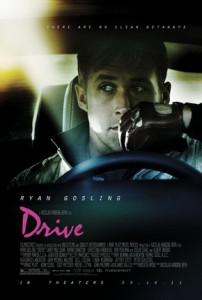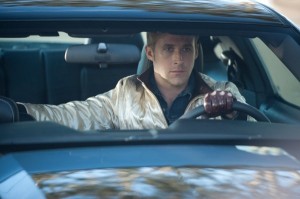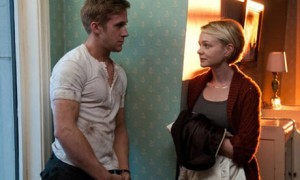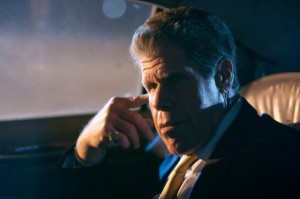
If you’re going into Drive expecting multiple car chases and stunts up the wazoo, you’ll be sorely disappointed. Yes, there are car chases and a few stunts. They’re not handled in the same vein as they are in films like the “Fast and the Furious” franchise, where they’re simply spectacle. There’s nothing wrong with that, as they worked well in those films since that was their agenda. Drive’s agenda isn’t of that caliber.
I liken it Anton Corbijn’s “The American”, which was released around the same time last year. That film’s promotion was a lot like this one’s; an action film with amazing chases and stunts. That was never the intention for either film, only of the film distributor(s). Both films aimed to show the dreary and depressing lives of criminals after their job is done.
Whereas “The American” focused on an assassin hiding out and trying to start a new life, Drive concentrates on a wheelman who is trying to strike up a relationship while dealing with his monotonous career. This film is more engaging for the casual viewer, as it has more events taking place, as opposed to simply stirring suspense via hollow tasks in “The American” (which, as you may recall, I loved and gave it my highest rating). It still builds suspense, even some from the same agenda, but moves quicker in it’s pacing, while still keeping it’s gear in neutral.

We’re the passenger in the car of Driver (Ryan Gosling), a quiet, secretive man who never reveals his actual name for safety’s sake. He’s a professional Hollywood stuntman/auto shop worker who moonlights as a wheelman. His rules are simple; you have five minutes to get in and out. You’re his for the duration of those five minutes. He’s not personally involved in what you’re doing or what happens afterward. If you go over your five minute time limit, you’re on your own.
The director, Nicolas Winding Refn, makes sure we stay put with Driver during the robberies, as opposed to entering the building with the criminals. This creates not only suspense, but furthers our emotional connection with Driver. As he vaguely listens to music and stares blankly into space, we feel the emotional withdraw this job has taken on him. He’s not in on the action, which most would view as the most thrilling part. He’s outside in the dark, waiting for his five minutes to run out, so he can go back home.

That’s not to say there aren’t thrilling obstacles for him. Not all jobs go smoothly, like the one that opens the movie, for instance. When two lowly robbers take too long and get them and Driver’s car identified by the police, he has to act fast and lay low. He wisely hides behind parked cars and turns off all the lights, waving off any suspicion. When a police helicopter spots him, he hightails it across town, as a police car chases him. All the while, he has the hockey game blaring through his speakers. Why does this matter? He uses it to his advantage. As he hears the game come to a close, he pulls into the stadium’s parking lot, parks his car in the midst of the fans, puts on the home team’s hat and slyly walks off into the city. What happened to the robbers? They don’t matter to him, therefore they don’t matter to us.
He goes home to a small apartment in a dirty apartment building, where he develops a crush on his neighbor, Irene (Carey Mulligan). She has a son, Benicio (Kaden Leos), whose father, Standard (Oscar Isaac), is in prison. The two strike up a quick, but meaningful relationship, based solely on Driver’s shy persona, sweet personality and fatherly connection with Benicio. Normally, fast relationships drag a film down. Here, it’s understandable as to why these two would fall for each other so quickly, turning the cliché into a positive.

Another cliché rears it’s ugly head, only for it to be beautiful, as well. Standard is released from prison and resumes his relationship with his wife and son. He knows of Driver and his friendly relations with his family and has his suspicions. However, Refn opts not to go for the usual angry stand-offs, but elicits tension via normal conversations. Standard welcomes Driver into his life as a friend, all the while still giving him the ugly eye every now and then.
Things get more complicated when Driver agrees to help Standard in robbing a pawn shop to pay off a rising debt he made in prison. We know both men are only doing this to protect Irene and Benicio and promise to keep things professional, as hard as that may be. Driver also has his attention focused on a job with his boss, Shannon (Bryan Cranston), who has signed him up for a job with Bernie Rose (Albert Brooks) and Nino (Ron Perlman). These two jobs intersect at one point, which is all I will reveal.

The joy in this film is to simply sit back and take the ride. For me to reveal anything else would ruin the suspense and impact of the film. Once again, a comparison to “The American” comes into play, as I had the same problem in reviewing that film as I do with this one. I can explain the film, but not give away too much. Doing so robs you of the film’s power.
This isn’t too much of a problem. All I’m here to do is lay out the blueprints and either recommend the film or give warning. Even if you hated “The American”, I still strongly suggest seeing this film. What didn’t work for you in that film will hopefully work it’s magic here. If not, then I’ll steer you away the next time a film like this comes out. I’ll still highly praise that film like I’m doing with Drive, but give notice for you.
Final Rating: A+
